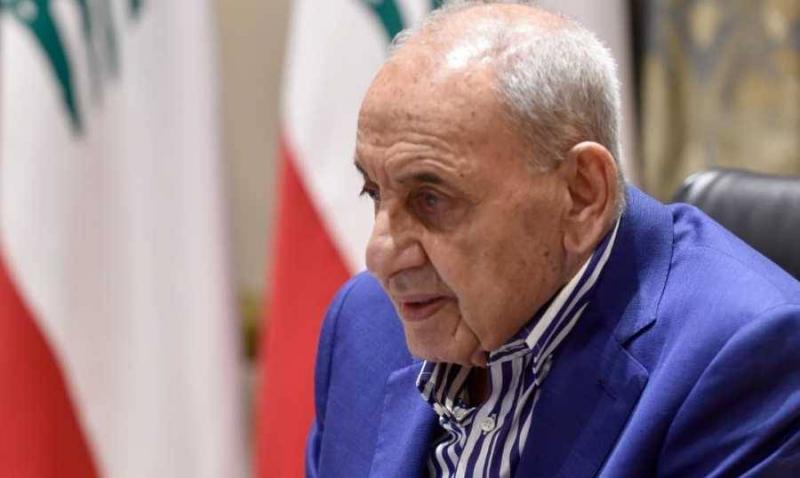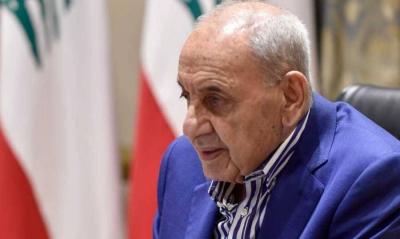The Quintet Committee embarks on a renewed attempt to clear the mines planted on the path to the presidential entitlement, trimming the trees of conditions and obstruction, and birthing a solution that brings all parties to the election hall. The main station today is at Ain al-Tineh, as the ambassadors of the Quintet countries in Lebanon meet with the Speaker of Parliament, Nabih Berri. This meeting, as confirmed by informed sources accompanying the Quintet's movements to "Al-Jumhuriya," represents the official start of the "Quintet" efforts, which will soon be followed by a delegation led by Jean-Yves Le Drian in Beirut. The ambassadors will present the broad outlines they agreed upon in their recent meeting at the residence of the Saudi Ambassador in Lebanon, Walid Bukhari. These outlines summarize the necessity for political parties to precede the escalating dangerous developments in the region by translating their country's urgent need to elect a President of the Republic and restore the normalcy of political life in Lebanon at this stage, especially since there are other regional and international commitments associated with the developments taking place in the region, which Lebanon must actively engage with, given that some of them directly concern it, particularly concerning Resolution 1701 and any potential measures or arrangements in the relevant areas.
While the Quintet Committee reflects through its ambassadors the significance of its endeavors and presents them as a precious opportunity for the Lebanese to fulfill their entitlements, well-informed sources confirm to "Al-Jumhuriya" that the committee seeks, through its renewed efforts, to strongly push for an internal consensus on a presidential candidate. On this basis, Le Drian will move among the concerned parties, armed with the compelling necessities for this consensus imposed by recent developments in the region. However, a responsible source informed "Al-Jumhuriya" that they do not possess any information regarding what the ambassadors or Le Drian will propose - if he visits Lebanon - but in any case, the success of the committee's mission is tied to two conditions: First, that the new effort of the committee does not merely repeat the previous effort, wasting time on surveys about the obligations and specifications that conclude with a wish for the parties to agree on electing a President of the Republic. All parties have already given their input on the obligations and specifications and communicated direct answers to Le Drian, either in writing or verbally. Rather, the committee’s direct involvement in determining the names of candidates, and encouraging the parties to finalize their nominations, without the committee endorsing any name under the label of a new choice or third option, would condemn the committee’s mission to certain failure. Additionally, the measure of the success of the "Quintet" effort is linked to the committee's ability to secure a commitment from all parties to provide a quorum for the convening of the electoral session in the Parliament to elect one of them. Failing that would be a further waste of time.
Second, it depends on the extent of the parties' responsiveness to the Quintet committee’s mission, a matter that seems elusive for now, as evidenced by the rigid conditions and positions of some parties regarding the shape and identity of the President, which have not changed in the 15 months of presidential vacancy. Deciphering this riddle is primarily the responsibility of the Quintet countries, which have direct allies in Lebanon, and if they are genuinely interested in formulating a presidential solution, they can exert their direct influence on them to facilitate consensus and provide the quorum needed for the election of a president.
While the committee has repeatedly noted that there is no disagreement among its members regarding the presidential file in Lebanon, and that they hold a unified stance on this file, sharing a common perspective on Lebanon's interests and a single goal of enabling the Lebanese to elect a president and form a government that can begin implementing the necessary reforms and urgent remedies for the economic and financial crisis, political circles are raising questions about the motivations behind the renewed Qatari movement via envoy "Abu Fahd" Jassim bin Fahd Al Thani, who is conducting quiet political meetings alongside the Quintet effort.
In this regard, a responsible source noted through "Al-Jumhuriya" that the Qatari movement is not a recent phenomenon but predates the Quintet's efforts. The meetings held with certain parties, whether with the Amal Movement and Hezbollah or with the head of the Marada Movement, Suleiman Franjieh, or others, have not yielded anything that could be considered significant in the presidential context. This movement does not appear to align with all members of the Quintet committee, which has been noted in private discussions. Consequently, with the Quintet announcing its intention to move again, the Qatari movement has naturally faded into the background.
"Al-Jumhuriya" asked a senior official about the Qatari envoy's mission, to which he responded: "First, I have not met him personally. Second, as is known, Qatar operates on multiple fronts in the region, and its role is clear in parallel efforts regarding the Israeli war on the Gaza Strip, whether concerning prisoners or formulating ceasefires in this war. Therefore, I believe that the Qatari envoy’s visit to Beirut, aside from his main mission related to the presidential file, is connected to efforts aimed at cooling the southern front and preventing the escalation and expansion of the war."




